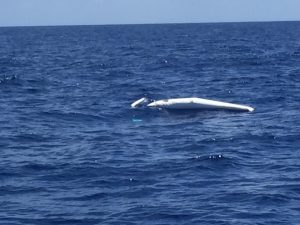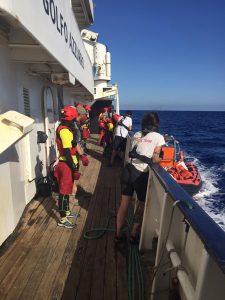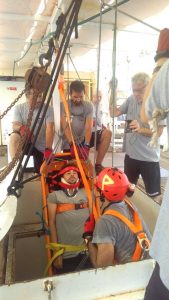With easing northerly winds we left Tunisia for the 10 hour trip back to the rescue zone. It is unlikely that boats will be setting off from Libya for another day or two because the onshore breeze is a bit strong yet, but by Wednesday it is likely that there will be a mass exodus.
Today we have been cruising slowly along the coast, about 6 miles outside Libyan territorial waters. We have come across 2 partially deflated rubber boats, but only one uninhabited life jacket. It is usual for rescue vessels to mark these boats with spray paint to signify pickup, but neither of these had been marked. One can only hope that souls were not lost from them.

deflated refugee boat
At the moment we are the only rescue vessel on station, but See Fuchs in Tunisia and our Open Arms sister ship in Malta are en route, in anticipation of the better weather expected mid-week. It is frustrating at the moment, because we all want to start work, doing what we are here to do.
In the meantime we spend our time with MOB and SAR exercises. Ricardo, our Head of Mission, has the ship’s crew and volunteers working efficiently and professionally together. In anticipation.



There is something quite extraordinary about this whole operatic refugee business. Italian and EU authorities hover quietly 70 miles to the north but will not hold station down here as rescue vessels. Thousands of refugees amass on the shore waiting to be taken to sea, assuming that they will be retrieved and taken to new lives in Italy. Morally, our justification is clear – the saving life at sea. But from here the bigger issue – what to do to manage this steadily increasing flow of refugees – seems insoluble. The answer should lie with an examination of the local national pressures which lead people to begin their extraordinary journeys from their homelands, and with the Libyan government, but nothing seems to be happening. The governments of Morocco, Tunisia and Egypt are able to prevent smuggling activity, but I am told that here in Libya local fishing boats, the police and Coast Guard are all actively involved with the people smugglers. For a cut in the profits, of course.
